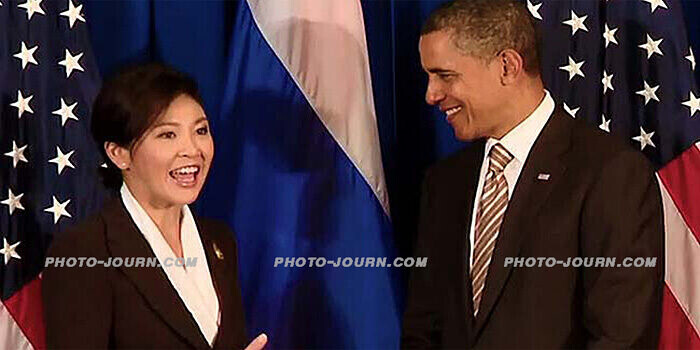Bangkok is abuzz at the imminent visit of freshly re-elected US President Barack Obama on a whirlwind three-nation tour to shore up US support in the region, however trade discussions threaten to overshadow the stated purpose of the visit, a courtesy call to mark 180 years of Thai-US relations.
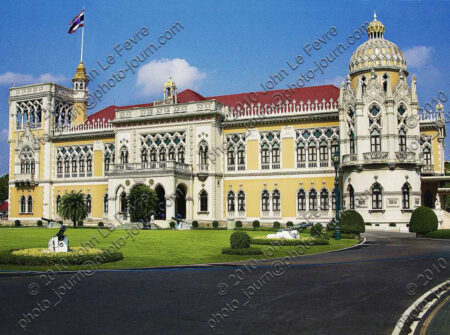
While details such as the number of security personnel to be deployed (more than 1,000), snipers being stationed on Bangkok rooftops (nothing new in that) and details such as the US President travels with his own bottled water supply and his advance team are concerned about giant water monitors at Government House have proved entertaining reading, it is trade that is capturing the most interest.
On Monday the Thailand government announced that it will hold negotiations with the US over the possibility of joining the controversial Trans Pacific Partnership (TPP) trade agreement.
The announcement has seen a flurry of opposition from academics, economists, and interest groups with Aat Pisanwanich, dean of the School of Economics at the University of the Thai Chamber of Commerce warning Thailand’s service sector is not competitive enough to become a part of the TPP.
Mr Aat also claimed financial institutions will be adversely affected under the TPP, as too would Thailand’s technology sector.
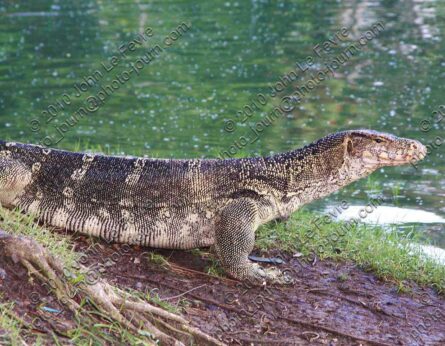
Also voicing concerns about Thailand’s intention to signup for the TPP is Thailand’s central bank, the Bank of Thailand (BoT), warning that joining the TPP could hamper regulations on capital flows and financial services.
In a paper prepared on the TPP Harit Rodprasert, a senior BoT economist warned that although capital inflows promote investment and economic development, they could lead to volatility and a bubble in the property sector or a liquidity shortage during capital flight.
Former Thailand prime minister Abhisit Vejjajiva has also urged a cautionary approach, calling on the government to clarity the negotiating framework as the TPP would have a substantial impact on Thailand.
Wise words considering that when President Obama announced the USAs intention to join the TPP in 2009 he told Congress that negotiations would shape “a new kind of trade agreement for the 21st century, bringing home the jobs and economic opportunity we want all our trade deals to deliver”.
TPP more than just tariffs and exchange of goods
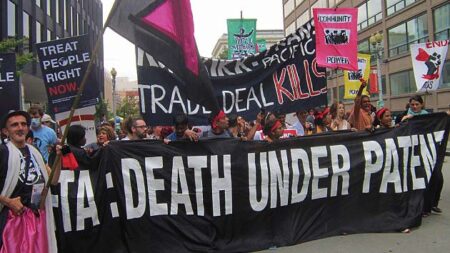
Apart from patchy details of controversial clauses leaked to the public little is known about the 26 provisions of the TPP, an expansion of the 2005 Trans-Pacific Strategic Economic Partnership Agreement, but these leaks have been enough to see widespread opposition from advocacy groups, and elected officials globally.
So worrying are some aspects of the TPP and the secrecy surrounding its scope that independent news and advocacy organisations have described it as The Most Important Trade Agreement That We Know Nothing About and A Worldwide Corporate Power Grab of Enormous Proportions.
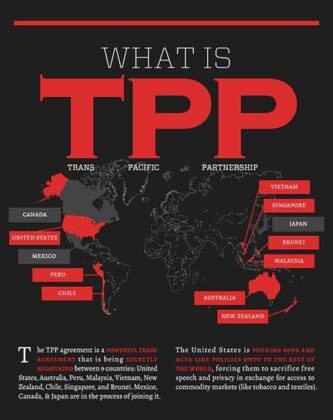
In August a bipartisan group of US lawmakers sent a letter to the the top US trade negotiator “in the strongest possible terms” demanding details of the TPP, particularly in relation to its intellectual property provisions.
Criticism and protests over restrictions imposed by the TPP have been voiced globally since its inception in 2007 and despite claims the pact now has 11 members, only the four original signatories – Chile, New Zealand, Singapore and later Brunei – are full members, while the United States, Australia, Peru, Vietnam, Malaysia, Mexico, and Canada are still negotiating the terms of the TPPs various clauses.
So far 14 meetings have been held attempting to thrash out the pact, with the 15th to be held between December 3 to 12, 2012, in Auckland, New Zealand.
Anti-globalists, privacy groups, and human rights advocacy groups internationally claim the TPP goes far beyond the realm of tariff reduction and trade promotion, granting unprecedented power to corporations and infringing upon consumer, labor, and environmental interests.
TPP strengthens patent protection for drugs more than any trade agreement
The Electronic Frontiers Foundation (EFF), a highly respected and long-established defender of consumers digital rights says the TPP “threatens to extend restrictive intellectual property (IP) laws across the globe and rewrite international rules on its enforcement”.
According to the EFF US negotiators are “pursuing a TPP agreement that will require signatory countries to adopt heightened copyright protection that advances the agenda of the US entertainment and pharmaceutical industries”.
Human rights group Amnesty International says the TPP “neglects protections for fair use and standard judicial guarantees‚ such as the presumption of innocence, and includes copyright provisions that could compromise free speech on the internet and access to educational materials.

“Draft TPP provisions related to patents for pharmaceuticals risk stifling the development and production of generic medicines by strengthening and deepening monopoly protections” the group said ahead of the 14th round of negotiations in September.
In a detailed article on the TPP in the respected journal Nature, science journalist Amy Maxmen said previously leaked documents indicate the “TPP looks likely to strengthen patent protection for drugs more than any trade agreement so far.
Nature warns that “some countries may be tempted to forgo access to generic drugs in exchange for better access to US markets in other industries.
in a 2011 report addressing the TPP Mdecins Sans Frontires (also known as Doctors Without Borders) says that counties which have rejected patents on new formulations of the off-patent HIV drug Abacavir now sell generic versions for as little as $US139 per person per year, whereas in Malaysia pediatric Abacavir costs $1,200 per child per year, because the country granted the new formulation a patent.
“The first generation of HIV drugs have come down in price by 99 per cent over the last decade, from $10,000 per person per year in 2000 to roughly $60 today, thanks to generic production in India, Brazil and Thailand where these drugs were not patented.
“About 80 percent of donor- funded anti-AIDS drugs and 92 percent of drugs to treat children with AIDS across the developing world comes from generic manufacturers” MSF says.
Despite the mounting levels of concern and lack of any public debate the Thailand Ministry of Commerce says the government will hold a press conference to formally affirm its commitment to seek membership of the TPP during the the US President’s visit.
The old adage that one should be wary of Greeks bearing gifts is somewhat dated and in the 21-st century, with pressure to create jobs and increase exports, one should perhaps be be more wary of US President’s bestowing the honour of an official visit than wooden horses.
Feature photo John Le Fevre
Related:
He has spent extensive periods of time working in Africa and throughout Southeast Asia, with stints in the Middle East, the USA, and England.
He has covered major world events including Operation Desert Shield/ Storm, the 1991 pillage in Zaire, the 1994 Rwanda genocide, the 1999 East Timor independence unrest, the 2004 Asian tsunami, and the 2009, 2010, and 2014 Bangkok political protests.
In 1995 he was a Walkley Award finalist, the highest awards in Australian journalism, for his coverage of the 1995 Zaire (now Democratic Republic of Congo) Ebola outbreak.
Most recently he was the Thailand editor/ managing editor of AEC News Today . Prior to that he was the deputy editor and Thailand and Greater Mekong Sub-region editor for The Establishment Post, predecessor of Asean Today.
In the mid-80s and early 90s he owned JLF Promotions, the largest above and below the line marketing and PR firm servicing the high-technology industry in Australia. It was sold in 1995.
Opinions and views expressed on this site are those of the author’s only. Read more at About me
Latest posts by John Le Fevre (see all)
- Kaavan’s great escape photo special (video & gallery) – November 30, 2020
- A real life fairy tale: Cambodia provides sanctuary to Kaavan, the world’s loneliest elephant (video & gallery) *updated – November 30, 2020
- Death for corruption and press freedom abused as Thailand continues Nth Korean-like slide – July 23, 2015
- Thailand’s young rice farmers boost income, slash costs with switch to organic, AWD method – May 29, 2015
